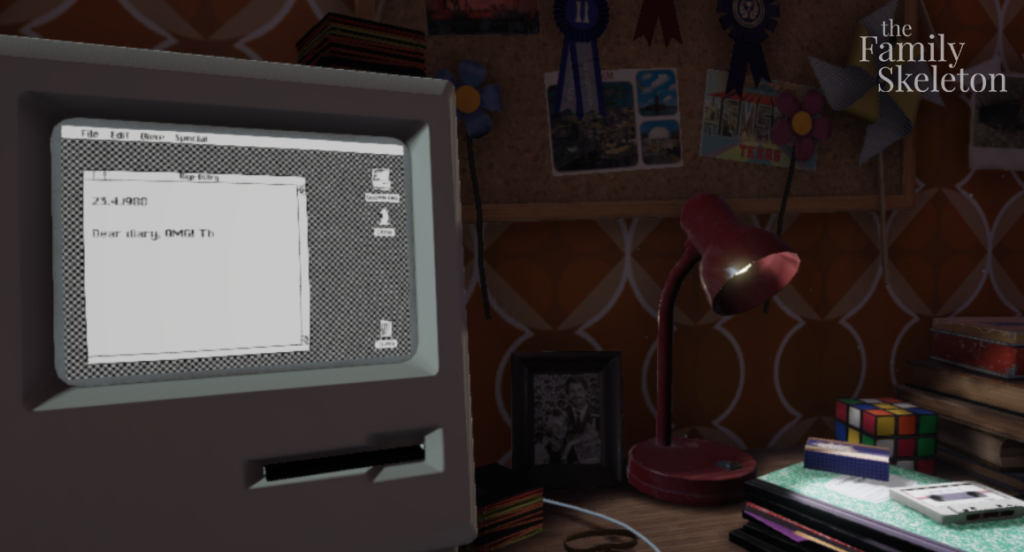![]() If you are like me, having spent many summers reading choose your own adventure books, exhausting every path over and over, you probably have a tangible understanding and appreciation of how much work goes into branching fiction.
If you are like me, having spent many summers reading choose your own adventure books, exhausting every path over and over, you probably have a tangible understanding and appreciation of how much work goes into branching fiction.
Not only each branch has to create a meaningful path worth exploring, they also have to provide enough content as to not simply be the wrong thread to follow that wraps up the story in a few pages.
We are working on a prequel for our game The Family Skeleton which employs a branching narrative to tease out some of the story, the characters and the theme for the main game. The game has the player int he shoes of Paige, a young woman who is going through a difficult time. Through Paige’s computer interface, we guide her through different daily events in diary form. She types the day’s events and we pick how it ends for each day, which dictates what happens in the following entry. It is indeed very much like a choose your own adventure book, only darker in theme.
![]()
As you choose different options at the end of each diary entry, you rightfully expect a different outcome. That expectation becomes very hard to fulfill by the poor soul who has to write all that text. I will now discuss how a foldback structure every few nodes not only remedies the load branching creates but also can be used strategically to expose the player to certain key nodes that contain essential information regarding the story.
![]()
The figure to the side shows how branching would work if each node/page/thing-that-leads-to-a-choice was to let the audience choose one of two paths. There are only two steps into the story with only two choices available yet we have to author seven nodes.
As you can imagine, this gets exponentially larger as we add more choices.
![]() One way to manage the branching is using foldbacks. Every few nodes down a path, we can merge them down to a single one, shown as the yellow node here. This would mean, the user’s choice did not matter in the first place, no? Well, yes. Eventually, we are forcing the user to the content we choose them to see, but this can be used to the advantage of the author.
One way to manage the branching is using foldbacks. Every few nodes down a path, we can merge them down to a single one, shown as the yellow node here. This would mean, the user’s choice did not matter in the first place, no? Well, yes. Eventually, we are forcing the user to the content we choose them to see, but this can be used to the advantage of the author.
The nodes user get to explore may reveal information about the story, characters or the lore of the world that may not have any effect on the outcome of the events yet enrich the audience’s experience of the said events by possibly rendering them through a different perspective.
In the context of our game, the player can choose to talk to the counselor about her recurring nightmares or can chalk it up to stress from school and think it would go away on its own. Depending on her choice, the nodes that represent the following days would be different. If she chose to talk to the counselor, the according content would be presented to her, if not, some other content where she does something else. We can merge the follow-ups of these two options into a single node where she, say, gets into an argument with her mother. Considering the argument she got into has nothing to do with the previous choices, we can segue into this new, merged note without building on the choices made.
Choice 1 would read as:
Paige is having nightmares -> Talks to the counselor -> Gets into argument with mom about her behavior.
Choice 2 would read as:
Paige is having nightmares -> She takes a day off to relax, it has been a hard week -> Gets into argument with mom about her behavior.
Moreover, if the argument she gets into is a key moment in the story we have to expose the player to, it becomes a useful device to merge the story into one node here, giving us opportunity to reveal information in a sequence. This, by the way, a very common definition of what a story is: a meaningful sequence of events.
The key here is to not make the player feel like their choices does not matter. The nodes that will be merged still need to have meaningful information and events that either build the characters, have some role-play value or reveal some non-essential information that can have a short term (a few nodes) effect on things. Otherwise, we would be removing the feeling of agency (or the illusion of) and the story would feel more like a theme ride where the player is now merely a spectator and probably pissed at the game as the game keeps rendering them powerless without rewarding their choices with anything.
